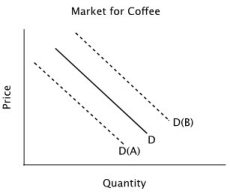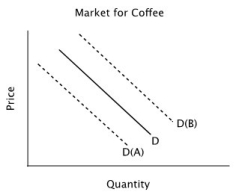A) the substitution effect of a price change.
B) the income effect of a price change.
C) a decrease in the buyer's reservation price.
D) an increase in the buyer's reservation price.
F) C) and D)
Correct Answer

verified
Correct Answer
verified
Multiple Choice
If price is above the equilibrium price, then there will be:
A) both excess supply and excess demand.
B) neither excess supply nor excess demand.
C) excess supply.
D) excess demand.
F) B) and C)
Correct Answer

verified
Correct Answer
verified
Multiple Choice
Shelly purchases a leather purse for $400. One can infer that:
A) she paid too much.
B) her reservation price was at least $400.
C) her reservation price was exactly $400.
D) her reservation price was less than $400.
F) B) and C)
Correct Answer

verified
Correct Answer
verified
Multiple Choice
In a free market, if the price of a good is above the equilibrium price, then;
A) sellers, dissatisfied with growing inventories, will raise their prices.
B) buyers, hoping to ensure they acquire the good, will bid the price lower.
C) the government will set a lower price to reestablish the market equilibrium.
D) sellers, dissatisfied with growing inventories, will lower their prices.
F) All of the above
Correct Answer

verified
Correct Answer
verified
Multiple Choice
If fast food is an inferior good then:
A) the demand for fast food will fall as income falls.
B) the demand for fast food will fall as income rises.
C) the quantity of fast food demanded will rise as the price of fast food rises.
D) the demand for fast food will fall as the price of fast food rises.
F) A) and B)
Correct Answer

verified
Correct Answer
verified
Multiple Choice
Refer to the accompanying figure. Suppose the solid line shows the current demand for coffee. In response to news that next year's coffee harvest will be extremely good due to favorable weather conditions, you should expect: 
A) the quantity of coffee demanded to decrease, but no shift in the demand curve.
B) the demand curve to shift to D(A) in anticipation of lower future prices.
C) the demand curve to shift to D(B) in anticipation of lower future prices.
D) neither a change in quantity demanded nor a shift in demand because it will be a long time before next year's coffee crop is harvested.
F) None of the above
Correct Answer

verified
Correct Answer
verified
Multiple Choice
Assume the demand for coffee increases and the supply of coffee decreases. Which of the following outcomes is certain to occur?
A) The equilibrium price of coffee will rise.
B) The equilibrium quantity of coffee will rise.
C) The equilibrium price of coffee will fall.
D) The equilibrium quantity of coffee will fall.
F) All of the above
Correct Answer

verified
Correct Answer
verified
Multiple Choice
Refer to the accompanying figure. Suppose the solid line shows the current demand curve for coffee. In response to an announcement that much of next year's coffee crop has been destroyed by a storm in Brazil, you should expect: 
A) an increase in the quantity of coffee demanded, but no shift in the demand curve.
B) the demand curve to shift to D(A) in anticipation of higher future prices.
C) the demand curve to shift to D(B) in anticipation of higher future prices.
D) neither a change in quantity demanded nor a shift in demand because next year's coffee crop will not affect the current demand for coffee.
F) None of the above
Correct Answer

verified
Correct Answer
verified
Multiple Choice
Suppose a new study highlights the health benefits of eating bacon. At the same time, suppose the cost of producing bacon falls. Given these changes, you should expect to see:
A) a decrease in the equilibrium price of bacon, but it's hard to say what will happen to the equilibrium quantity.
B) an increase in the equilibrium quantity of bacon, but it's hard to say what will happen to the equilibrium price.
C) an increase in both the equilibrium price and quantity of bacon.
D) an increase in the equilibrium price of bacon, but it's hard to say what will happen to the equilibrium quantity.
F) A) and D)
Correct Answer

verified
Correct Answer
verified
Multiple Choice
As coffee becomes more expensive, Joe starts drinking tea instead of coffee. This is called:
A) the income effect of a price change.
B) a decrease in reservation price.
C) the substitution effect of a price change.
D) a decrease in demand.
F) None of the above
Correct Answer

verified
Correct Answer
verified
Multiple Choice
Efficiency is an important social goal because:
A) it assures a fair outcome.
B) it assures a normative outcome.
C) movements toward economic efficiency make the total economic pie larger.
D) it takes into consideration the distribution of income.
F) B) and D)
Correct Answer

verified
Correct Answer
verified
Multiple Choice
All else equal, a decrease in the demand for oranges will lead to a(n) ________ in equilibrium price and a(n) ________ in equilibrium quantity.
A) increase; decrease
B) decrease; decrease
C) decrease; increase
D) increase; increase
F) All of the above
Correct Answer

verified
Correct Answer
verified
Multiple Choice
Refer to the given table. Relative to column C, column D represents:
A) an increase in supply.
B) an increase in demand.
C) a decrease in demand.
D) a decrease in supply.
F) A) and C)
Correct Answer

verified
Correct Answer
verified
Multiple Choice
When the supply curve shifts to the left and there is no change in demand:
A) the market cannot reestablish an equilibrium.
B) the equilibrium price will fall.
C) the equilibrium quantity will rise.
D) the equilibrium price will rise.
F) B) and C)
Correct Answer

verified
Correct Answer
verified
Multiple Choice
If the local slaughterhouse gives off an unpleasant stench, then the equilibrium quantity of meat will be ________ the quantity that maximizes total economic surplus.
A) more equitable
B) equal to
C) lower than
D) higher than
F) A) and D)
Correct Answer

verified
Correct Answer
verified
Multiple Choice
When the demand curve shifts to the right and supply doesn't change:
A) quantity demanded will rise.
B) equilibrium price will fall.
C) equilibrium quantity will rise.
D) supply will rise.
F) A) and C)
Correct Answer

verified
Correct Answer
verified
Multiple Choice
Suppose that when the price of broccoli is $4 per pound, buyers wish to buy 500 pounds per day and sellers wish to sell 800 pounds per day. In this case:
A) excess supply will lead the price of broccoli to fall.
B) excess demand will lead the price of broccoli to fall.
C) excess supply will lead the price of broccoli to rise.
D) excess demand will lead the price of broccoli to rise.
F) All of the above
Correct Answer

verified
Correct Answer
verified
Multiple Choice
Suppose that when the price of oranges is $3 per pound, the quantity demanded is 4.7 tons per day and the quantity supplied is 3.9 tons. In this case:
A) excess demand will lead the price of oranges to rise.
B) excess supply will lead the price of oranges to fall.
C) excess demand will lead the price of oranges to fall.
D) excess supply will lead the price of oranges to rise.
F) B) and C)
Correct Answer

verified
Correct Answer
verified
Multiple Choice
You have noticed that there is a persistent shortage of teachers in an inner-city school district in your state. Based on this observation, you suspect that:
A) the wage for teachers in that district is higher than the wage in other districts.
B) the wage for teachers in that district is lower than the equilibrium wage.
C) there is an excess supply of teachers in other districts.
D) the demand for teachers in the inner-city school district is too low.
F) B) and C)
Correct Answer

verified
Correct Answer
verified
Multiple Choice
Which of the following is NOT a characteristic of a market in equilibrium?
A) There is neither excess supply nor excess demand.
B) Neither buyers nor sellers want the price to change.
C) Sellers can sell as many units as they want at the equilibrium price.
D) Buyers can buy as many units as they want at the equilibrium price.
F) C) and D)
Correct Answer

verified
Correct Answer
verified
Showing 141 - 160 of 181
Related Exams